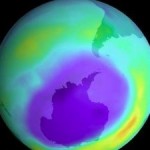
Honolulu – Greenpeace today hung a banner at Honolulu’s Aloha Tower reading “WCPFC: Don’t Let Time Run Out on Tuna”. The group is urging Pacific fishing nations, including the US, to agree on bold measures to protect Pacific tuna at the Western and Central Pacific Fisheries Commission (WCPFC) meeting taking place in Honolulu next week. The WCPFC meeting begins tomorrow, just as science shows the Pacific region’s tuna stocks are threatened by massive overfishing.
“Time and tuna are running out in the Pacific. This Honolulu meeting provides a chance for nations that fish in the Pacific to avoid repeating the failures of other tuna management meetings this year to create sustainable fisheries and healthy oceans,” said Phil Kline, Greenpeace USA oceans campaigner.
“Greenpeace is demanding that the US and other fishing nations back a proposal by Pacific Island Countries to close large areas of international waters in the Pacific to purse seine fishing to reverse the disastrous impacts of overfishing and illegal pirate fishing on the region’s troubled bigeye and yellowfin tuna stocks and the people dependent on them,” continued Kline.
Despite calls from scientists to reduce catches since 2001, record catches have been consecutively hauled out of the Pacific in the last three years. Fleet capacity is growing and fishing methods are more efficient than ever in finding and capturing tuna. Wasteful fishing methods such as the use of fish aggregation devices (FADs – man-made objects used to attract tuna to purse seine fishing nets) are largely to blame.
“The out-of-control use of FADs is resulting in the needless wasting of sharks, turtles and juvenile tuna and rendering the once plentiful skip-jack fisheries unsustainable. This fishing method must be banned if there is to be a tuna industry able to provide the Pacific region with jobs in the years to come,” said Lagi Toribau of Greenpeace Australia Pacific.
Since industrial fishing began nearly sixty years ago, nearly 90% of the world’s large fish – such as tuna and swordfish – have been taken from our oceans. If current practices continue unchecked, the fishing industry will literally fish itself out of existence. The recent failing of the International Commission for the Conservation of Atlantic Tunas (ICCAT) to prevent the near-certain collapse of the Atlantic bluefin tuna proves that the undue influence of the fishing lobby on oceans management is out of control.
“More than half of the world’s tuna is fished from the Pacific, and negotiators here in Honolulu have one of the last chances to get so-called oceans management right,” added Sari Tolvanen, Greenpeace International oceans campaigner. “The world, including the Pacific region, needs living oceans to survive and the best way to restore our oceans to health is by creating more marine reserves – wildlife parks at sea. If this meeting fails to reduce fishing and create more marine reserves, it’s aloha for the Pacific tuna and the millions of people it supports.”
Greenpeace is campaigning for a sustainable fishing industry and a global network of marine reserves covering 40% of the world’s oceans as the necessary steps to leaving future generations with oceans able to sustain life on earth.
For more information about Greenpeace’s efforts at the WCPFC, please visit:
Source: Greenpeace Press Release dated December 5, 2010.
Related Feature:













